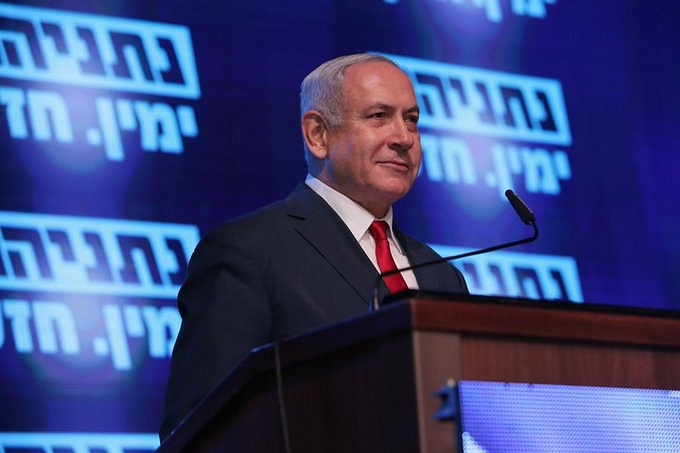Insta
Israel’s Year-Long Political Crisis Comes To An End As Netanyahu, Gantz Agree To Form Unity Govt

Israeli PM Benjamin Netanyahu (@netanyahu/Twitter)
Benjamin Netanyahu will remain Israel's Prime Minister after he agreed to form a national unity government with his main political rival, Benny Gantz, a deal which brings a year-long political crisis to an end.
In a joint statement on Monday (20 April) night, the ruling center-right Likud Party and the liberal Blue and White Party said: "An agreement for the establishment of a national emergency government is now being signed," Efe news reported.
The deal comes after three back-to-back elections had failed to yield a clear winner between incumbent Netanyahu, in power since 2009, and former army chief Gantz.
Although the statement did not provide further details, the rivals have reportedly agreed to share the role of prime minister on a rotating basis, with Netanyahu occupying the post for the first 18 months before handing over power to Gantz, who will initially become Minister of Defence.
In a statement on Twitter, Gantz said they had "prevented" the fourth round of elections.
"We will maintain democracy, we will fight against the coronavirus and will protect the citizens of Israel. There is a national emergency government," Gantz wrote.
Netanyahu, meanwhile, promised "to work to save the lives and livelihoods of Israeli citizens".
The result of the negotiations is a remarkable turnaround for Israel's longest-serving prime minister, who has three serious corruption charges pending against him.
Three rounds of elections had already been held with similar results after each poll, but the coronavirus crisis added an extra layer of urgency to the process this time around.
Israel is under a nationwide lockdown with over 13,650 confirmed cases and 173 deaths.
Reports in Israeli media indicate that the cabinet will be split between members of the Likud party and its various junior coalition partners, which include ultra-orthodox and ultra-right wing parties, and the Blue and White alliance, which groups together left-leaning and liberal factions.
(This story has been published from a wire agency feed without modifications to the text. Only the headline has been changed.)
Introducing ElectionsHQ + 50 Ground Reports Project
The 2024 elections might seem easy to guess, but there are some important questions that shouldn't be missed.
Do freebies still sway voters? Do people prioritise infrastructure when voting? How will Punjab vote?
The answers to these questions provide great insights into where we, as a country, are headed in the years to come.
Swarajya is starting a project with an aim to do 50 solid ground stories and a smart commentary service on WhatsApp, a one-of-a-kind. We'd love your support during this election season.
Click below to contribute.
Latest